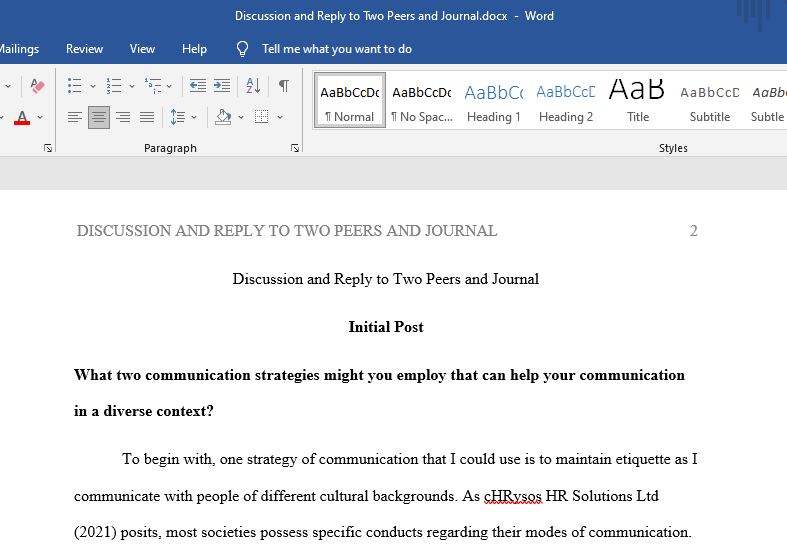What two communication strategies might you employ that can help your communication in a diverse context?
Communicating in Diverse Contexts
You can experience communication differences with those in all cultural contexts. These differences should not be seen as a barrier, but as an opportunity.
For this discussion, please respond to the following:
- What two communication strategies might you employ that can help your communication in a diverse context?
- Think about a personal or professional situation where there was a communication breakdown. How would you approach this situation differently by applying one of the communication strategies you selected above?
Response
Two communication strategies that might help me with my communication in a diverse context is that I would use empathetic listening in situations because the goal is to get help to cope with or solve the problem and see the world, frame or reference the speaker from their side of things( Hamilton et al, 2019). The Empathetic listener may lean on the emotions, however incorporating diversity, and interpersonal communication, one may reserve the emotion and stick to the facts of the matter. In addition, talking about ideas or opinions openly conveys trust. Next,I would use ‘‘paraphrasing and perception’’ on checking the clarity of the other side’s position(Hamilton et al,2019). Interests show that in one’s own opinion, but in the other person involved in the matter and therefore it shows respect for what your colleague must share.
Recall a time back when I was working retail. I was assigned a section that was my responsibility to take care of and organize everything. It was a long day and it was hard but I managed to stay on top of my sections but one of the managers was upset because when the store was close to closing everyone was in my section. We were all just standing and talking not really focusing but it was close to the end of the day and I didn’t think it was a big deal and sections/tasks were done. The manager got mad and was yelling at everyone but mostly me because it was my first month in training and I felt that was the problem, the communication was off between us. I was deeply hurt and embarrassed by this because this manager had been riding since I got hired and has made my job extremely uncomfortable, therefore everyone would always talk to me or help here and there but this day it was just too much and I just couldn’t hold it in anymore so I approach and talked to the manager. Let’s just say it didn’t go well. Instead I ended up meeting with the big boss because Iended up crying emotionally. That day was crazy but I had to express myself and get the manager and the big boss to understand me and realize that I’m not wrong.If had express myself sooner insteading of waiting a month things probably would been better between me and the manager, eventually we did became better even friends that took lunch breaks and got each other food together. Once I got my emotions out of communication and understood why the manager was doing what she did, things with her got better and communication was a lot better.
References:
Hamilton, Cheryl & Creel, Bonnie & Kroll, Tony. ( © 2019).Communicating for success, 2nd edition.
Response
Hello Class,
The first strategy I use when communicating with other diverse people is that always keep an open mind. Instead of being judgmental or disagreeing I first hear the speaker and see their main points of the conversation. The second strategy I use is using small words like “wow!” or “really?” to make the speaker communicate more about the conversation.
One situation that I had with a co-worker was that I was listening to the conversation and not including any feedback or experience that made her feel that I knew where she was coming from. If I would have been more proactive in the conversation I would have had better communication and she would have felt that she was being heard. I would have approached this conversation differently if I inputted feedback and showed more involvement in the conversation.
Journal_____In at least 200 words, please respond to the following:
- What is the most significant thing you learned in this unit about diversity and intercultural backgrounds?
- How can you apply this to a professional or personal diverse context?
Requirements: different lengths | .doc file
Answer preview:

word limit:684
